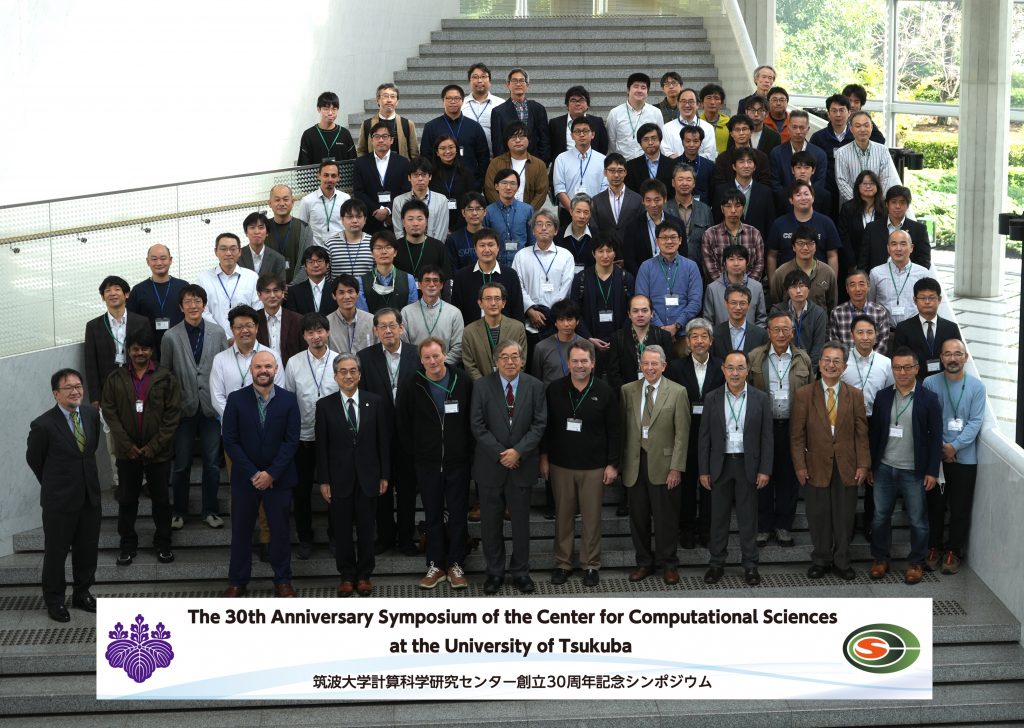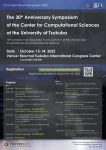Dates and Venues / Program / Registration / Access information
Computational science plays an indispensable role in all areas of science and technology today. The dramatic development of supercomputers has greatly expanded the frontiers of large-scale computational research. Efforts to fuse disciplines and create new fields of study through computation are actively underway.
Interdisciplinarity is a major characteristic of computational science. To take full advantage of this, it is important to have regular and frequent opportunities for exchange and cooperation among the various fields of computational science, as well as between the fields of computer science and information science, which support the development of computational science. The former organization of the Center for Computational Sciences at the University of Tsukuba was established in 1992 as a place for collaboration among the various fields of computational science, computer science, and information science as described above. The center was reorganized and expanded in April 2004 with the current name. The center has been accredited by the Ministry of Education, Culture, Sports, Science and Technology as “the Advanced Interdisciplinary Computational Science Collaboration Initiative (AISCI)” and is promoting a Multidisciplinary Cooperative Research Program using the Center’s computational resources.
This symposium will be held at the Epochal Tsukuba International Congress Center to commemorate the 30th anniversary of the Center’s establishment. The symposium will be held in a format that allows for either in-person or online. The official language is English. We have prepared interesting talks by our invited researchers who are active at the forefront of their respective fields in computational science. In addition, oral and poster presentations will be given to report the results of the Multidisciplinary Cooperative Research Program organized by the center. In both talks and presentations, cutting-edge research in computational science, which is developing in a variety of scientific fields such as physics, life science, and earth science, will be introduced in a form that is easy to understand for researchers and graduate students from other fields. We hope that the lectures and discussions will provide a good opportunity for active exchange of views on the frontiers of computational science and computer science, as well as on collaboration among these fields.
We look forward to your participation.
Dates and Venues
Dates: 13 Oct. [Thu] 13:30 - 14 Oct. [Fri] 17:00
Venue: Epochal Tsukuba International Congress Center “Hall 300”
Program
13 Oct.
| 13:30 – 14:00 | Welcome address | |
| Chair: NUKADA Akira / KURAMASHI Yoshinobu | ||
| 14:00 – 14:30 |
Jeffrey S. Vetter |
|
| 14:30 – 15:00 |
High Precision Physics from High Performance Computing [Abstract] [PDF] |
Norman H. Christ (Department of Physics, Columbia Univ.) |
| 15:00 – 15:30 | Poster indexing 1 of MCRP2021 | |
| 15:30-15:50 | Break | |
| Chair: HINOHARA Nobuo / OTANI Minoru | ||
| 15:50 – 16:20 |
Machine learning and quantum computing in physics research and education [Abstract] [slides (external link)] |
Morten Hjorth-Jensen (University of Oslo/Michigan State Univ.) |
| 16:20 – 16:50 | Computics approach to development of the next-generation semiconductor science [Abstract] [PDF] | OSHIYAMA Atsushi (Nagoya University) |
| 16:50 – 17:20 | Poster indexing 2 of MCRP2021 | |
| 18:00-20:00 | Reception (at Hotel Grand Shinonome) | |
14 Oct.
| Chair: KAMEDA Yoshinari | ||
| 9:30 – 10:00 |
Persistent Memory Supercomputer Pegasus for Data-driven and AI-driven Science [Abstract][PDF] |
TATEBE Osamu |
| 10:00 – 12:00 | Poster session: Report of Multidisciplinary Cooperative Research Program in 2021 (MCRP2021) | |
| 12:00 – 13:30 | Break | |
| Chair: MORI Masao / INAGAKI Yuji | ||
| 13:30 – 14:00 | Simulating the Evolution of the Universe and the Emergence of its Non-linear, Multi-scale, Interconnected Structures [Abstract] [PDF] | Andreas Burkert (Ludwig-Maximilians Universität München) |
| 14:00 – 14:30 | Using and developing bioinfomatics in deep level phylogenomic reconstructions [Abstract] [PDF] | Matthew Brown (Mississippi State University) |
| 14:30 – 14:50 | Break | |
| Chair: KUSAKA Hiroyuki / BOU Savong | ||
| 14:50 – 15:20 | Developing Climate Resilient Cities: From Heat Islands to Digital Twins [Abstract] [PDF] | Dev Niyogi (University of Texas at Austin, USA) |
| 15:20-15:50 | Data Science for the Study of History: from Statistics to Machine Learning [Abstract] [PDF] | Chuan XIAO (Osaka University) |
| 15:50-16:00 | Closing | YABANA Kazuhiro |
Registration
Participants should fill out the registration form at https://forms.gle/Sqid42qkJtkmuhMD9 by September 20th, 2022. The registration is free, and the party fee is 8,000 JPY.
Access information
– From airports to Tsukuba Center
There are two airports in the Tokyo area: Narita Airport and Haneda Airport. It takes about one hour from either airport to Tsukuba Center by direct bus, but the bus service may be reduced or the schedule may be changed due to COVID-19.
For access to Tsukuba Center by train, please refer to the following page.
Airport Access | TX : (https://www.mir.co.jp/en/access/)
– From Tokyo to Tsukuba Center
Rapid trains of Tsukuba Express (TX) Line bring you to Tsukuba station from Akihabara station in Tokyo in 45 minutes. See the following maps:
* Tsukuba Express Line Timetable (https://transfer-train.navitime.biz/tx/trains-timetable?target=weekday&direction=1&lang=en)
* Tokyo Metro Subway Map (http://www.tokyometro.jp/en/subwaymap/)
– To International Congress Center Epochal Tsukuba (https://www.epochal.or.jp/eng/access/map_shuhen.html)
Organizing Committee
Chair: KAMEDA Yoshinari
BOU Savong
HINOHARA Nobuo
HORI Yuta
INAGAKI Yuji
KUSAKA Hiroyuki
MORI Masao
NUKADA Akira
OHNO Hiroshi
OTANI Minoru
Advisory member:
BOKU Taisuke
NAKATSUKASA Takashi



